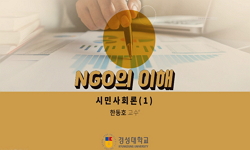It is the most significant change of the 21st century that society is governed by economic principles. The economic principles are implemented without regard to nations and doctrine. The nation is asked to establish its credibility in order to make th...
http://chineseinput.net/에서 pinyin(병음)방식으로 중국어를 변환할 수 있습니다.
변환된 중국어를 복사하여 사용하시면 됩니다.
- 中文 을 입력하시려면 zhongwen을 입력하시고 space를누르시면됩니다.
- 北京 을 입력하시려면 beijing을 입력하시고 space를 누르시면 됩니다.
https://www.riss.kr/link?id=T9852409
- 저자
-
발행사항
안동 : 안동대학교 대학원, 2001
-
학위논문사항
학위논문(석사) -- 안동대학교 대학원 , 행정학과 행정이론전공 , 2001. 2
-
발행연도
2001
-
작성언어
한국어
- 주제어
-
KDC
350 판사항(4)
-
발행국(도시)
경상북도
-
형태사항
iv, 99p. : 삽도 ; 26cm.
-
일반주기명
참고문헌 수록
- 소장기관
-
0
상세조회 -
0
다운로드
부가정보
다국어 초록 (Multilingual Abstract)
This study aims at providing helpful suggestions to NGO and looking for effective ways to deter corruption by analyzing the activities of NGO. After realizing the importance of deterring corruption and the lack government's ability. NGO takes the place of the government based on historical background and Korean circumstances.
My study examines the activities of the two leading groups; Peoples' Solidarity for Participatory Democracy (PSPD) and Citizens Coalition for Economic Justice (CCEJ). PSPD is regarded as the outstanding anti-corruption organization among NGO and CCEJ works to deter corruption. The activities of the organizations were investigated from the foundation of organizations to the first half of the 20th century. Generally, internal and external factors of the two organizations require consideration from all aspects because of their close connection with deterring corruption. Among PSPD and CCEJ, two independent organizations play an important role in deterring corruption. One is the organization for making society clean and the other is the organization for rooting out illegality and corruption. The results of my thesis show that PSPD and CCEJ have common problems in relation to deterring corruption regarding the internal factors of the organizations. In the view of human resources the absence of members, uneven distribution of staff and lack of specified manpower are the main problems. Regarding material resources these groups are operated with insufficient financial funds and limited chances, which makes it difficult for the public and group members to express their opinions when decisions are made.
Regarding the external factors of the organization, PSPD and CCEJ showed the same problems after analyzing their relationship with the government. The two organizations didn't put much effort on examining the legal and structural measures of the government for solid financial aids. These groups were busy restraining the government corruption so that opinions from other organizations were rarely applied to the government policy.
Both PSPD and CCEJ have difficulty in deterring corruption because they put too much emphasis on increasing their budget to invest in corruption cases. The two organizations neglect the duties of decreasing the number of investigations against corruption and considering moral conscience and responsibility. The rallies of both organizations were small, isolated and decentralized to deter corruption. Also, these organizations failed to make their rallies nationwide event. and include the public because their activities were conducted by a distinguished family.
After considering the problems, it is required to find some self-help programs from civic groups and some support from the government in order for the civic groups to carry out effective corruption deterrent programs. First of all, the following refers to the self-help programs of civic groups. These are some plans concerning internal factors of organizations; plans for human and material resources, and plans for democratic decision making. Regarding external factors of organizations' civic groups should have a close relationship with the government, keeping self regulation and identity. When civic groups build up goals and plans, various strategies should be considered for comprehensive corruption deterring. Specific activity plans which tie the public together should be examined.
After the government takes poor financial conditions of civic groups into consideration the indirect support plan from the government should be provided rather than direct financial fund. It is necessary to eliminate the major obstacles which do not allow charitable funds from the public to be absorbed into the civic groups. Regarding the activities deterring corruption, it is urgent to think over the possible suggestions to deter corruption within the condition of not destroying self regulation and identity of civic groups.
It is the most significant change of the 21st century that society is governed by economic principles. The economic principles are implemented without regard to nations and doctrine. The nation is asked to establish its credibility in order to make the nation flourish. However, widespread corruption in the society becomes the major factor which has a negative impact on a nation's credibility. Even though previous Korean governments made an effort to fight corruption, the desired results were not achieved. Corruption seems to be a serious problem even in the present government, what is called, “the government for the people.”
This study aims at providing helpful suggestions to NGO and looking for effective ways to deter corruption by analyzing the activities of NGO. After realizing the importance of deterring corruption and the lack government's ability. NGO takes the place of the government based on historical background and Korean circumstances.
My study examines the activities of the two leading groups; Peoples' Solidarity for Participatory Democracy (PSPD) and Citizens Coalition for Economic Justice (CCEJ). PSPD is regarded as the outstanding anti-corruption organization among NGO and CCEJ works to deter corruption. The activities of the organizations were investigated from the foundation of organizations to the first half of the 20th century. Generally, internal and external factors of the two organizations require consideration from all aspects because of their close connection with deterring corruption. Among PSPD and CCEJ, two independent organizations play an important role in deterring corruption. One is the organization for making society clean and the other is the organization for rooting out illegality and corruption. The results of my thesis show that PSPD and CCEJ have common problems in relation to deterring corruption regarding the internal factors of the organizations. In the view of human resources the absence of members, uneven distribution of staff and lack of specified manpower are the main problems. Regarding material resources these groups are operated with insufficient financial funds and limited chances, which makes it difficult for the public and group members to express their opinions when decisions are made.
Regarding the external factors of the organization, PSPD and CCEJ showed the same problems after analyzing their relationship with the government. The two organizations didn't put much effort on examining the legal and structural measures of the government for solid financial aids. These groups were busy restraining the government corruption so that opinions from other organizations were rarely applied to the government policy.
Both PSPD and CCEJ have difficulty in deterring corruption because they put too much emphasis on increasing their budget to invest in corruption cases. The two organizations neglect the duties of decreasing the number of investigations against corruption and considering moral conscience and responsibility. The rallies of both organizations were small, isolated and decentralized to deter corruption. Also, these organizations failed to make their rallies nationwide event. and include the public because their activities were conducted by a distinguished family.
After considering the problems, it is required to find some self-help programs from civic groups and some support from the government in order for the civic groups to carry out effective corruption deterrent programs. First of all, the following refers to the self-help programs of civic groups. These are some plans concerning internal factors of organizations; plans for human and material resources, and plans for democratic decision making. Regarding external factors of organizations' civic groups should have a close relationship with the government, keeping self regulation and identity. When civic groups build up goals and plans, various strategies should be considered for comprehensive corruption deterring. Specific activity plans which tie the public together should be examined.
After the government takes poor financial conditions of civic groups into consideration the indirect support plan from the government should be provided rather than direct financial fund. It is necessary to eliminate the major obstacles which do not allow charitable funds from the public to be absorbed into the civic groups. Regarding the activities deterring corruption, it is urgent to think over the possible suggestions to deter corruption within the condition of not destroying self regulation and identity of civic groups.
목차 (Table of Contents)
- 目次
- 第1章 序論 = 1
- 第1節 硏究의 目的 = 1
- 第2節 硏究의 對象과 範圍 = 4
- Ⅰ. 硏究의 對象 = 4
- 目次
- 第1章 序論 = 1
- 第1節 硏究의 目的 = 1
- 第2節 硏究의 對象과 範圍 = 4
- Ⅰ. 硏究의 對象 = 4
- Ⅱ. 硏究의 範圍 = 5
- 第3節 硏究의 方法 = 6
- 第2章 理論的 背景 및 分析틀 = 7
- 第1節 腐敗의 槪念 및 原因과 統制方法 = 7
- Ⅰ. 腐敗의 槪念 = 7
- Ⅱ. 腐敗의 原因 = 8
- Ⅲ. 腐敗의 統制方法 = 12
- 第2節 NGO의 槪念과 登場背景 = 17
- Ⅰ. NGO의 槪念 = 17
- Ⅱ. NGO의 登場背景 = 20
- 第3節 分析의 틀 = 21
- Ⅰ. NGO의 影響力 決定 要因 = 21
- Ⅱ. NGO의 影響力 行使方法 = 24
- Ⅲ. 模型의 圖式 = 25
- 第3章 腐敗統制를 위한 國內 反腐敗NGO의 活動現況 = 27
- 第1節 腐敗統制를 위한 參與連帶의 活動 = 27
- Ⅰ. 組織內部的 側面 = 27
- Ⅱ. 組織外部的 側面 = 40
- Ⅲ. 參與連帶의 腐敗統制活動 = 44
- 第2節 腐敗統制를 위한 經實聯의 活動 = 52
- Ⅰ. 組織內部的 側面 = 52
- Ⅱ. 組織外部的 側面 = 62
- Ⅲ. 經實聯의 腐敗統制 活動 = 66
- 第3節 參與連帶와 經實聯의 腐敗統制 活動의 比較 = 75
- 第4章 腐敗統制를 위한 國內 NGO 活動의 問題點과 改善方向 = 77
- 第1節 活動의 問題點 = 77
- Ⅰ. 組織內部的 側面 = 77
- Ⅱ. 組織外部的 側面 = 79
- Ⅲ. 具體的 活動의 側面 = 80
- 第2節 改善方向 = 81
- Ⅰ. 組織內部的 側面 = 81
- Ⅱ. 組織外部的 側面 = 83
- Ⅲ. 具體的 活動의 側面 = 85
- 第5章 結論 = 87
- 第1節 要約 및 政策的 示唆點 = 87
- 第2節 後續硏究를 위한 提言 = 89
- 參考文獻 = 91
- Abstract = 97










